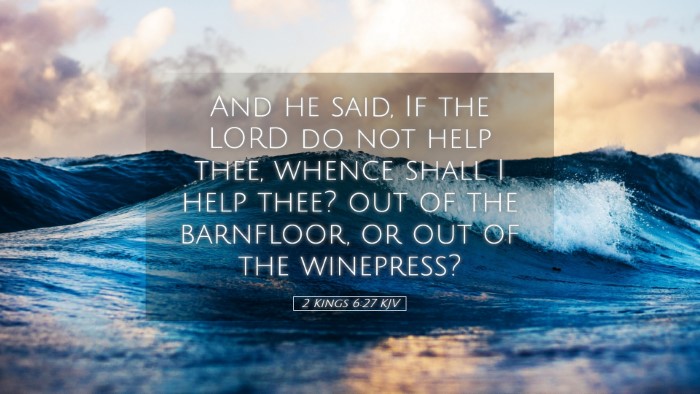Commentary on 2 Kings 6:27
Verse: "And he said, If the LORD do not help thee, whence shall I help thee? out of the barnfloor, or out of the winepress?" (2 Kings 6:27, KJV)
Contextual Background
The context of 2 Kings 6:27 is set during a time of severe famine in Samaria, where the Israelite kingdom faced dire straits due to a siege by the Arameans. This moment reveals the depth of despair that the city encountered, reflecting on the spiritual and physical decay of Israel during its tumultuous periods of disobedience to God.
Theological Insights
Divine Provision and Human Limitations
In this poignant moment, the king of Israel, who is referred to indirectly in the preceding verses, faces a situation where human resources and strategies have utterly failed. Matthew Henry elaborates on the notion that this query posed by the king illustrates the futility of seeking help from man in times of extraordinary distress. He draws the reader’s attention to the understanding that true help must come from God, for human efforts are inadequate when faced with divine judgment or severe calamities.
God’s Sovereignty
Albert Barnes comments on the king’s acknowledgment that without divine intervention, there is no hope. This highlights the sovereignty of God, emphasizing that human understanding and solutions often fall short when confronting the overwhelming power of natural or spiritual crises. This verse teaches theologians that in times of crisis, reliance on God is fundamental, allowing for a reflection on the nature of faith amid desperate circumstances.
A Reflection on Leadership
The response of the king reveals the responsibilities of leadership during a crisis. Adam Clarke points out that the weight of leadership brings not only the burden of decision-making but also the need for steadfast faith and reliance on God’s sovereignty. The king's inability to provide for the people reflects a deeper spiritual ailment – a lack of trust in God’s promise of provision. This presents a challenge for pastors and leaders today to proclaim reliance on God to their congregations in times of trouble.
Practical Applications
- Faith in Times of Trouble: This verse serves as a reminder that believers must keep their faith strong even as they face overwhelming challenges, reinforcing that God is their ultimate source of help.
- Preaching God’s Sovereignty: Pastors can use this passage to emphasize the sovereignty of God in their sermons, encouraging congregants to trust in God’s provision instead of seeking solutions solely through human means.
- Leadership and Accountability: Leaders should take the example of the king's despair as a warning against losing sight of God during their leadership journeys, ensuring they continually encourage dependence on divine wisdom and provision.
Conclusion
2 Kings 6:27 encapsulates a pivotal moment of realization about the insufficiency of human means in the face of divine calamity. Through public domain commentaries, we see the insights about faith, leadership, and the sovereign nature of God taking precedence over human effort. Believers, scholars, and leaders are thus urged to immerse themselves in the understanding that true help comes from the Lord, which is an enduring lesson relevant in any era.


